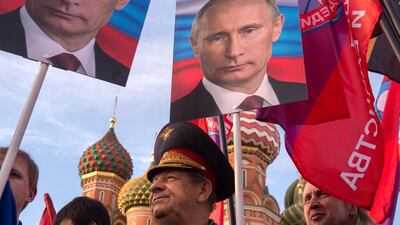Next week, Russian president Vladimir Putin will speak at the 70th session of the United Nations General Assembly in New York. This will be his first address to the UN in a decade and the first time he sets foot on US soil since his re-election in 2012.
In much of the West, Mr Putin is seen as a ruthless former KGB spy who heads a corrupt and repressive regime that has annexed Crimea, invaded Ukraine’s eastern border region and meddles in Syria. Most observers expect him to denounce what he sees as the West’s illegal sanctions against Moscow and American arrogance in international affairs.
In a world dominated by western powers, Russia's leader will surely be tempted to extol the virtue of regional alliances in which Moscow plays a prominent role. That includes the Brics countries – Brazil, Russia, India, China and South Africa – and their emerging economies as well as the Shanghai Cooperation Organisation, often dubbed "Nato of the East". It also applies to the nascent Eurasian Economic Union with Kazakhstan and Belarus.
Amid posturing about Russia’s global power and the crisis of western hegemony, Mr Putin will hardly admit the severe economic crisis at home or Russia’s isolation abroad.
The expectation is that his speech will feature plenty of knee-jerk anti-Americanisms and wishful thinking about Russia’s leadership in upholding a balance against western domination.
However, such views overstate Russia’s reliance on Cold War ideology and underplay Moscow’s pragmatism. In the current context, Mr Putin is far more likely to emphasise shared threats and common ground for cooperation. Since before September 11, 2001, the Kremlin has argued that terrorism is the overriding security threat, not least in the restive region of Chechnya in Russia’s majority-Muslim Caucasus where Moscow has waged two brutal wars in the past 20 years.
Today, terrorism is no longer confined to groups of Chechen independence fighters or Al Qaeda. Russia considers ISIL to be the biggest danger to stability across the wider Middle East that stretches to its southern borders. Moscow is increasingly worried about the possible return of about 2,000 Russian-speaking jihadists who are fighting Russia's ally Bashar Al Assad.
The second shared threat is nuclear proliferation in the hands of rogue regimes such as North Korea or hardliners in Iran. That is why Moscow pushed for a comprehensive deal with Iran that includes a credible verification mechanism to ensure Tehran is using nuclear energy only for civilian purposes.
Crucially, the Kremlin fears that Syria will descend into the same sort of chaos as Iraq or Libya following western military interventions that attempted to introduce democracy by missile and drone, with no regard for basic state institutions or the unleashing of religious forces that have led to sectarian cleansing. Moreover, Russia has consistently raised the fate of Christians and other religious minorities.
Moscow’s stance on Syria has been rightly criticised for supporting Mr Al Assad’s murderous rule and for projecting power across an already volatile region. However, it is hard to see how the Syrian conflict and regional instability can be addressed without Russia. If Mr Al Assad were to go tomorrow, Syria would fall into the hands of various jihadi groups rather than the foreign-backed opposition. For this reason, Mr Putin suggested back in 2012 that there be a political transition at the end of which Mr Al Assad would leave power but the Syrian state would not be dismantled.
Nor is Russian diplomacy merely colluding with the Shia crescent from Syria via Iraq and Iran to Hizbollah. On the contrary, the Kremlin has forged close links with Sunni-dominated Turkey and Egypt, where it agreed with the West in supporting the Egyptian military’s action against president Mohammed Morsi. Recently, Russia has reached out to Saudi Arabia’s King Salman, who is expected to visit Moscow before the end of this year.
All this suggests a strong dose of pragmatic realpolitik rather than rabid nationalism or an unreconstructed Cold War mentality.
For these reasons, Mr Putin would be well-advised not to lecture other countries on upholding international law or giving the UN a greater role. This would amount to the same hypocrisy and double standards of which Russia regularly accuses the West. It would also ignore the new reality of old and new “empires” and zones of influence beyond the borders of sovereign states. If ISIL is at one extreme end of this spectrum, then only a temporary alliance of ancient cultures and new countries who defend civilisation against barbarism can defeat it.
A Russia that wants to show the world it is not synonymous with corruption or occupation needs to play a responsible and constructive role. Mr Putin is a master tactician who has an eye for opportunity, but can he overcome his own worst instincts? His UN intervention should give us a clue.
Adrian Pabst is senior lecturer in politics at Britain’s University of Kent and visiting professor at the Institut d’Etudes Politiques de Lille (Sciences Po), France

